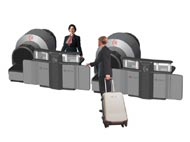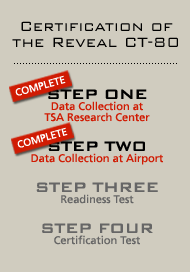 |
||||||||||||||||||||||
 |
|
|||||||||||||||||||||
The funding of future LOIs is in question, especially for larger airports. Please read this report from the AAAE regarding funding of Letters Of Intent (LOI) for the reimbursement of baggage handling systems. More than ever, there is a real need for 100% screening without incurring the cost of rebuilding your airport’s entire baggage handling system. Reveal Imaging has developed a small, next generation EDS that installs at the check-in desk at 1/4 cost of back room inline systems. It connects to the baggage handling system at the front end, dramatically reducing installation costs. This dual energy CT-based system measures density and atomic number to ensure 100% screening with low false alarms. For more information, visit: www.revealimaging.com.
Funding Challenges Threaten LOI Program Budget challenges, caused in part by an FAA reauthorization bill provision meant to help airports, will hamper the Transportation Security Administration’s (TSA’s) ability to hand out more repayment promises for permanent checked-baggage screening projects at airports, a top TSA official said Friday. TSA has approved—or is close to approving—letters of intent (LOI) for 10 airports: Atlanta, Boston, Dallas/ Fort Worth, Denver, Houston Intercontinental, Las Vegas, Los Angeles, Orlando, Phoenix, and Seattle. Each LOI calls for the government to reimburse airports for 75 percent of each multimillion-dollar inline baggage screening system project. But the new FAA bill raises the federal match to 90 percent, and includes a provision to make the change retroactive to the existing LOI. That provision, said TSA Chief Technology Officer Randy Null at the Third Annual AAAE/TSA/DHS Aviation Security Summit in Washington, D.C., adds $220 million to the cost of the 10 LOIs—or all but $30 million of the fiscal year 2004 funding allocated for the LOI program, excluding carry-over money from 2003. Worse, Null said, considering the funding levels in the bill’s out years, the new 90 percent match requirement may preclude TSA’s ability to hand out more LOIs. "The problems we face are in (fiscal years) 2005 and beyond," Null said. "Our ability to go beyond that 10 is going to be very questionable, because of my ability to maintain those payments in out years." LOIs are structured to repay airports over several years. That means funding levels—which the FAA bill set at $250 million per year through 2007—must cover new LOIs as well as payments of existing LOIs that are spread over multiple years. " I wish I could tell you where I am today...whether we’re going to go beyond the 10," Null said. "Right now I think it’s going to be very, very difficult to go beyond the 10" without changes in the funding model, he said. Another, albeit smaller, hurdle is a new model for allocating LOI money, Null said. Starting in 2004, TSA will use an algorithm to determine how much LOI money to allocate to the different categories of airports. A similar method is used to divide FAA Airport Improvement Program money, Null noted. The result, Null suggested, is that smaller airports may get a bigger share of the LOI pie, which could further hamper the funding of large-sum LOIs typically required for the bigger airport baggage projects. – As reported by AAAE, Security Central, airportnet.org |
||||||||||||||||||||||
If you are having trouble viewing this, please visit http://www.revealimaging.com/egram/

